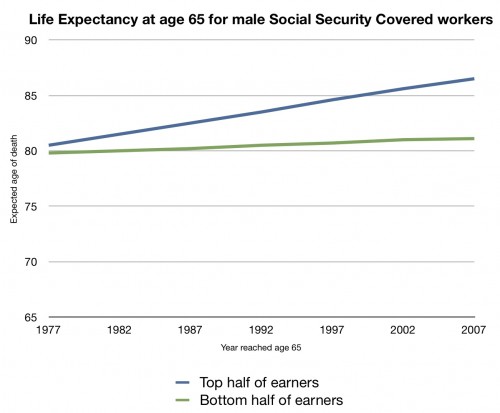Over at Forbes, Len Burman has a response to Paul Krugman’s post (which cites our work here at TIE). Len evidently signed onto a proposal gradually raising the eligibility age of Medicare. Len makes three arguments defending this position. Here’s the first:
The Affordable Care Act (health reform) will guarantee for the first time that everyone can get affordable health insurance coverage through the new exchanges. Pre-ACA, older people not yet eligible could face astronomical premiums if they had serious health problems (as older people often do). Starting in 2014, that won’t be true (and there are subsidies to encourage employers to provide health insurance coverage for retirees until the exchanges start).
Fantastic. But can we all agree that since a large number of people are trying to repeal the ACA, we can’t even put this on the table until everyone agrees to leave the ACA relatively intact? Otherwise, this is a terrible thing to do.
Here’s Len’s second argument:
ACA will offer very large subsidies to individuals with low or moderate incomes who buy insurance through the exchanges. People with incomes below 133% of the poverty level will qualify for Medicaid. People with incomes between 133 and 400% of poverty will qualify for premium subsidies. At 133% of poverty, they only have to pay 3% of income (about $600 per year for a couple at 2011 income levels). At 300% of poverty, they’d have to pay 8.05% of income (or about $3,550 for a couple with income of $44,000). A lot of lower-income seniors will face lower premiums through the subsidized exchanges than they’d pay in Part B and Part D (prescription drug) premiums for Medicare. (A full comparison of costs including copays and deductibles as well as premiums is beyond me, but maybe a health expert will weigh in with more information.)
Len’s basically throwing the ACA at us, as a defense that those who are denied Medicare at 65 and 66 will be able to get insurance, many of them with subsidies. No one disputes this is the case, if the ACA holds. Len is entirely ignoring Austin’s post, however, which clearly explains that the costs for this ACA solution are twice what the government will save if we go through with his plan. I don’t know how we can say this more clearly. The federal government will save $5.7 billion, but we will all pay $11.4 billion more. That’s a terrible idea, unless you think that the benefit is twice what 65 and 66 year olds were getting before. Let me put it this way: we could just tax the American people to raise $5.7 billion, provide Medicare to 65 and 66 year olds, reduce the deficit just as much, and that would cost us half what Len is proposing. Just because we can do something, doesn’t mean it’s a good idea. I cannot see why Len’s proposal is better than the status quo.
Here’s Len’s third argument:
The bottom line is that raising the Medicare retirement age primarily affects higher income older people, who are more likely to be able to keep working and can afford the premiums even if they don’t.
How is this the case? How many times must I show this?
The life expectancy at age 65 for those in the bottom half of earners has not risen at nearly the rate of the top half of earners. So raising the retirement age will impact the total benefits given to lower income people more than higher income people. Moreover, retirees at 400% of the poverty line ($43,320 for a single person) will get no subsidies and will pay far more for their insurance, even under the ACA, than they would under Medicare.
The bottom line is that Len seems to be saying that this won’t be as bad as it could be. That’s a terrible argument. It all hinges on the ACA staying as-is, and will still cost us twice as much in the private sector as we will save in the federal budget. If this is the “liberal case” for raising the age of eligibility, “liberals” need to try again.


